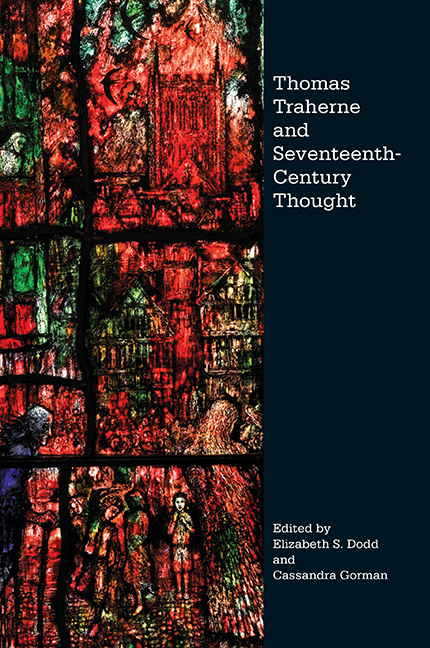Book contents
- Frontmatter
- Contents
- Contributors
- Acknowledgements
- Conventions and Abbreviations
- Foreword
- Introduction: ‘A lover of all Things … An Active ey’ (Select Meditations I.82): Traherne in Context
- PART I PHILOSOPHIES OF MATTER AND SPIRIT
- 1 ‘The Lanthorns Sides’: Skin, Soul and the Poetry of Thomas Traherne
- 2 No Things But In Thoughts: Traherne's Poetic Realism
- 3 Thomas Traherne and ‘Feeling Inside the Atom’
- 4 ‘Consider it All’: Traherne's Revealing of the Cosmic Christ in The Kingdom of God
- PART II PRACTICAL AND PUBLIC DEVOTION
- Afterword by Jacob Blevins
- Chronology of Traherne's Life and Contemporary Intellectual Developments
- Bibliography
- Index
- Index of Biblical References
- Studies in Renaissance Literature
3 - Thomas Traherne and ‘Feeling Inside the Atom’
from PART I - PHILOSOPHIES OF MATTER AND SPIRIT
Published online by Cambridge University Press: 05 July 2016
- Frontmatter
- Contents
- Contributors
- Acknowledgements
- Conventions and Abbreviations
- Foreword
- Introduction: ‘A lover of all Things … An Active ey’ (Select Meditations I.82): Traherne in Context
- PART I PHILOSOPHIES OF MATTER AND SPIRIT
- 1 ‘The Lanthorns Sides’: Skin, Soul and the Poetry of Thomas Traherne
- 2 No Things But In Thoughts: Traherne's Poetic Realism
- 3 Thomas Traherne and ‘Feeling Inside the Atom’
- 4 ‘Consider it All’: Traherne's Revealing of the Cosmic Christ in The Kingdom of God
- PART II PRACTICAL AND PUBLIC DEVOTION
- Afterword by Jacob Blevins
- Chronology of Traherne's Life and Contemporary Intellectual Developments
- Bibliography
- Index
- Index of Biblical References
- Studies in Renaissance Literature
Summary
They are more necessary to us, then the Existence of Angels. (The Kingdom of God, I, p. 347)
Thus Traherne concludes one of the chapters in his late study The Kingdom of God, the subject of which is not words of scripture, sacraments or prophets, but atoms. The chapter is remarkably prominent in the text, where it is positioned at the crux of meditations on elements of the spiritual and material cosmos. Traherne was fascinated with the atom as a connecting point between body and soul, time and eternity, humanity and the divine. He expands upon the topic of atomism yet further in another of his encyclopaedic works, the voraciously ambitious Commentaries of Heaven.1 In the Commentaries, Traherne endeavours to investigate ‘ALL THINGS’ in an alphabetically ordered, sequential study of individual subjects – the resulting text runs over 300,000 words, though sadly it only fulfils its ambitions between the words ‘Abhorrence’ and ‘Bastard’.2 The section on the ‘Atom’ is by far the longest in the text. There was something inherent to the subject of atomism that fuelled Traherne's pen, leading him to close with two of the longest poems in the Commentaries and the editorial query of whether ‘it be not best leav out some of these Poems’ (III, p. 363).
This chapter will reveal how Traherne expands upon the common theological reception of seventeenth-century atomism to create a means for the obtainment of ‘Felicitie’ and grace. He muses on the ‘indivisible’ atom as an image for the accommodation of divine mysteries, a rhetorical move that, though not entirely unusual in the latter half of the century, demands closer attention from the reader in the complexity of its interpretative possibilities. The driving force of his investigation is not so much on the atom as a means to deeper investigation of other unseen materials, but on the interior capacity of the atom itself. It is an entity that, rather like the intended final version of the Commentaries, encompasses ‘ALL THINGS’. Traherne's ‘Atom’ is more than a distanced literary symbol for the recognition of mortal frailty, or the greatness of God: it comes to function as a model for the ‘insatiable’ Christian soul, which in Traherne's theology is ever seeking to explore ‘All in All’.
- Type
- Chapter
- Information
- Thomas Traherne and Seventeenth-Century Thought , pp. 69 - 83Publisher: Boydell & BrewerPrint publication year: 2016



